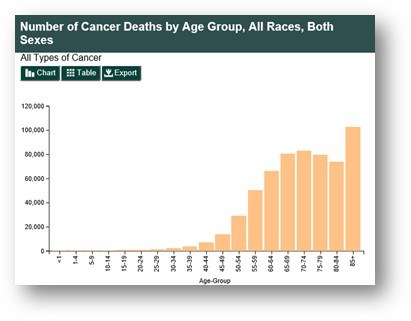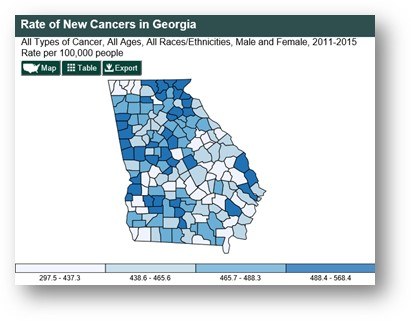Cancer

Comprehensive Cancer Control (CCC) consists of collaborative strategies to leverage community resources for cancer prevention, early detection, and treatment. NACCHO supports local health departments in planning, implementing, and evaluating evidence-based cancer prevention and control strategies to improve population health.
Latest News
NACCHO is pleased to announce the release of Tobacco Cessation for Cancer Survivors: A Resource Guide for Local Health Departments. This guide details the importance of tobacco cessation for cancer survivors and features recommendations on how local health departments can use existing resources to link cessation services to cancer survivors. This resource guide was created through collaboration with American Cancer Society under the Centers for Disease Control and Prevention cooperative agreement DP1315 National Support to Enhance Implementation of Comprehensive Cancer Control Activities.
In September 2017, the American Cancer Society and Centers for Disease Control and Prevention, in collaboration with the Department of Housing and Urban Development (HUD) and with the support of nine partner organizations including NACCHO, sponsored a Smokefree Public Housing Workshop. Six states were selected to participate during this workshop in order to enhance their capacity to implement the HUD Smokefree Public Housing Ruling. The Smokefree Public Housing Workshop Resources Summary provides a list of resources created during this workshop by federal agencies, national organizations and associations. The document provides descriptions of and links to guidance documents for supporting smokefree public housing, smoking cessation programs, toolkits, campaigns and publications.
This publication and resources were developed by the American Cancer Society and was funded by Cooperative Agreement Number 5NU38DP004969 through the Centers for Disease Control and Prevention. Its contents are solely the responsibility of the authors and do not necessarily represent the official views of the Centers for Disease Control and Prevention or the Department of Health and Human Services.
Webinar Recording: ‘Smoke-Free Public Housing Implementation; A Live Q and A with the Experts’
If you missed it! Listen to a recording of the “SmokeFree Public Housing Implementation; A Live Q and A with the Experts” webinar from April 18th, 2018 to learn more about smokefree housing policies, where they can be applied and how to prepare for the HUD smoke-free public housing rule prior to policy implementation. The experts were from The United States Department of Housing and Urban Development, American Lung Association and American Cancer Society. Webinar Recording is now available, Here.**The audio begins at minute 5.
The Centers for Disease Control and Prevention and the National Cancer Institute are pleased to announce the annual latest release of the U.S. Cancer Statistics, the official federal cancer statistics. This data resource combines data from CDC’s National Program of Cancer Registries and NCI’s Surveillance, Epidemiology, and End Results Program, providing the latest cancer information on the entire U.S. population.
The data release is a culmination of a tremendous amount of effort by cancer registrars, reporting facilities, central cancer registry staff, and CDC NPCR and NCI SEER staff and contractors. I thank everyone for their continued diligence in collecting high quality data.
Please help us to spread the word to your colleagues and contacts about this data release, which you can access through the updated Data Visualizations tool and public use database –
The U.S. Cancer Statistics Data Visualizations tool is an easy way to explore and use the latest U.S. Cancer Statistics data. It includes interactive graphics and data interpretations, which provide plain explanations of what the data mean. This past spring, prevalence, survival and county-level data were added to the tool! New cancer cases and cancer deaths data are available. And you can create trend graphs, maps, and tables by state, county, and demographic characteristics.
The U.S. Cancer Statistics public use database includes cancer incidence and population data for all 50 states, the District of Columbia, and Puerto Rico. The de-identified data are available through SEER*Stat software, at no cost to researchers. With more than 24 million cases in the database and 15 years of data available (2001 to 2015), researchers can conduct scientific inquiries into rare cancers and cancer trends.


More Information
U.S. Cancer Statistics | www.cdc.gov/uscs
CDC’s National Program of Cancer Registries | www.cdc.gov/cancer/npcr
NCI’s Surveillance, Epidemiology, and End Results Program | https://seer.cancer.gov
Questions? Please contact us at [email protected].
The following NACCHO resources were developed to help local health departments prevent cancer in their local communities.
NACCHO has partnered with the following organizations to help prevent cancer throughout the United States.
NACCHO has developed several policy statements related to Cancer for topics such as:
- Healthy Food Access
- Nutrition and Chronic Disease Prevention
- Transportation and Health
- Opposing Preemption of Tobacco Control Regulations
- Health in All Policies
- Supporting Local Legislation to Ban Hookah Smoking
- Regulation of e-Cigarettes
- Supporting Comprehensive Tobacco Prevention and Control
- Tobacco Prevention
- Menu Labelling, Trans Fats, and Salt
- Salt Reduction
You can find all of the policies and examples of letters to Congress, on the policies page.








